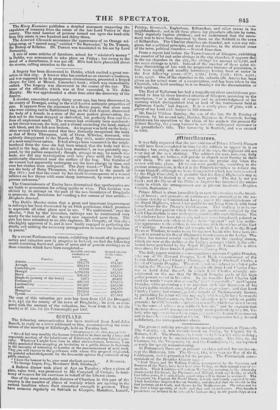SCOTLAND.
The following communication has been received from Lord John Russell, in reply to a letter addressed to him, communicating the reso- lutions of the meeting at Edinburgh, held on Tuesday last.
" Drundanri., Ca.t1e,21,6t Alten;tt 1811. " Sir—I feel very sensibly the honour intended totbe done net by a larr:c and respectable meeting of the inhabitants of Edinhargh, professing Liberai 1,1.in- eiples. Whatever I might have done in other circumstances; however, I am totally precluded from accepting an invitation to a public dinner in Scotland, by the necessity of returning to London at the commencement of' next week. I beg you will express to the gentlemen with whom this proposal originated, my grateful acknowledgments for the fitvourable opinion they entertain of my public conduct.
"I have the honour to be, your most obedient servant, J. Russerge "To George Logan, Esq., Alerehants' Hall, Edinburgh."
A Reform dinner took place at Ayr on Tuesday ; when a piece of plate, value 300/., was presented to Mr. Campbell of Craigie, in testi- mony of respect for his exertions in behalf of the Liberal cause.
One of the most remarkable features of Chartism in this part of the country is the number of places of worship which are opening in the various localities where their numerical strength is greatest. They have sermons regularly on Sabbath in Glasgow, Hamilton, Lanark, Paisley, Greenock, Eaglesham, Kilbarchan, and other towns in the
neighbourhood; and in all these places lay preachers officiate by turns. They regularly baptize children ; and we understand that the sacra-
ment was to have been dispensed by them on the Sabbath in the town of Kilbarchan. The Chartist churches are founded, not upon any reli- gious, but a political principle, and are therefore, in the strictest sense of the term, political churches.—Scotash Guardian.
From a report laid before the Town-Conneil of Glasgow, exhibiting the number of let and unlet sittings in the city churches, it appears that
in the ten churches in the city, the sittings let amount to 6,820, and
the unlet sittings to 4,829. Instead of the number of these unlet sit- tings diminishing of late with the progressive increase of population, it has been rapidly and steadily increasing; having been as under in
the four following years-1837, 3,592; 1838, 3,919; 1839, 4,261; 1840, 4,829. One of the churches in the suburbs (St. Ann's) has been
given up for actual want of a congregation, and has been taken by the Chartists, who hold meetings in it on Sundays for the dissemination of their opinions.
The Earl of Eglintoun has had a magnificent silver candalabrum pre- sented to him by three hundred citizens of Glasgow, according to the inscription, " as a tribute of respect and in acknowledgment of the courtesy which distinguished him as lord of the tournament held at Eglintoun Castle " last August. It is a costly piece of plate, with a group of my Lord and tharger in full armour.
Mr. David William Barclay, the SOD of the late Sir R. Barclay of Pierston, by his second lady, Harriet, Baroness de Cronstadt, having withdrawn his opposition to the claim of his nephew the present Sir Robert Barclay, the young baronet is now the undisputed successor to his grandfather's title. The baronetcy is Scottish, and was created in 1668.


























 Previous page
Previous page